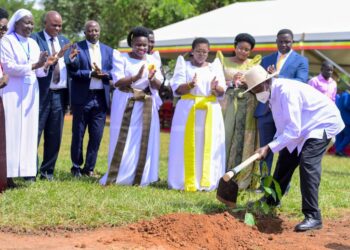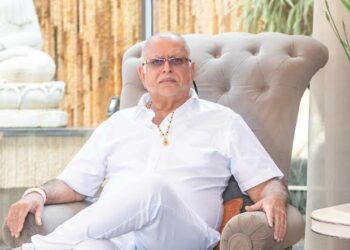September 8th, 2022 marked the end of the 70-year reign of Queen Elizabeth II, the longest-serving monarch of modern times. Her passing gave way to the accession of King Charles III, and the start of 12 days of mourning and rituals leading to her burial on September 19, 2022.
Like King Charles III said in his maiden address, Queen Elizabeth’s was a life well lived; a promise with destiny kept and she is mourned most deeply in her passing. Her 70-year long reign is a reflection of her kept promise and an inspiration to many. By the time of her passing, the Queen was patron to over 500 charities that have touched lives of millions of people across the world.
It is without doubt, that Queen Elizabeth II’s contribution to humanity shall forever be felt. The Queen shall also be remembered for her great leadership through the final moments of colonization, decolonization that shrunk her territory, and her capacity to keep a loyal Commonwealth, amidst political pressures and royal family challenges. The Queen is thus celebrated as the world’s most respected leader of this era.
After 70 years since the last royal funeral of King George VI in 1952, the world has been able to witness the level of sophistication and dedication to the traditions of the British Monarchy and the Church of England, throughout the events that followed her passing. The majority of the world’s population was seeing this for the first time. The level of organization and perfection exhibited at the funeral gives us great lessons to always be deliberate in preserving our traditions.
Having learnt from the mess that surrounded the death of Queen Victoria in 1901, 64 years since the death of George IV in 1837, when almost none could recall what happened during his funeral, the monarchy established a systematic plan dubbed The London Bridge as early as the 1960s. This plan detailed the protocols and rituals for the Queen’s funeral. It is therefore not surprising that Queen Elizabeth IIs funeral turned out to be the most majestic the world has ever witnessed.
The Queen’s death has also clearly brought out the position of the monarchy in the hearts and lives of the subjects. The emotions that followed her death and mourning throughout the commonwealth realms were a clear indication of the trust that people still have in the monarchy, regardless of some dissenting voices. As the Queen’s coffin lay-in-state, thousands waited hours in the queue to pay their last respects and thousands lined streets on her last journey from Balmoral to Edinburgh to Buckingham to Westminster and finally Windsor.
The queues at Westminster remind us of those witnessed in March 1971 when the body of Sir Edward Muteesa II, the first president of Uganda and former Kabaka of Buganda, lay at Namirembe Cathedral for public viewing. Those that witnessed this ceremony relate that queues stretched as far as Busega. However much we could say that the attachment that the people have to their cultural leaders is inherent, this attachment is strengthened by the contribution of these leaders to the well-being of their people.
Like the Queen, cultural leaders across the world and Uganda in particular, have got a great appeal to their masses, which they strategically utilize to support causes. For example, Buganda Kingdom, despite having no directing funding from the central government has effectively exploited this appeal to rally the people in different development initiatives and causes like blood donation campaigns to save lives, the campaign to end HIV/AIDS by 2030 and the fight against other diseases through the Kabaka Birthday run.
The cultural rituals that we have seen throughout the Queen’s final journey from Balmoral to Windsor, some as old as the 13th Century, and the blend of cultural and religious traditions done in the church, which even King Charles III pledged to preserve, should re-awaken our minds to the relevance and congruity of religious and cultural values. Ugandans can be as religious as the Archbishop of Canterbury, but still respect and practice their cultures that speak to their identity as a people. The British cultural rituals displayed are not different from the African rituals, to make the former sacred and the later satanic.
The Kingdom of Buganda has maintained a cordial relationship with the different faiths since their arrival on the invitation of Kabaka Muteesa I, in the late 19th Century. This has seen the different religious groups presiding over different Kingdom ceremonies. From the Queen’s funeral, it was evident that culture and religion can fully flourish together if extremism is avoided. As seen from the ancient British palaces, Buganda’s ancient architectural prowess at the Kasubi international heritage site whose restoration is yet to be completed, speaks to our great heritage.
The British monarchy has been a great pillar in the development of the United Kingdom. The key reason for this success is the monarchy’s state power that allows her to directly take part in all government decisions. Even without state power, the Kingdoms in Uganda have demonstrated goodwill for development through their numerous causes. We believe that those with state power pick a leaf from the British experience. The different cultures can be used by the government as entry points for developing communities rather than competitors.
The reason why the United Kingdom has managed to preserve their revered traditions lies in her decision making capacity in the affairs of the state. The people of Uganda were keen to this as demonstrated by their choice of the system of governance during the 1995 Constitution-making process, which revealed that Ugandans preferred a federal system of government. Through federalism, the different regions can easily implement legislation for the preservation of their heritage.
Lastly, there should be a great lesson to us with regard to the dissemination of sensitive news. Until Buckingham Palace announced the Queen’s death, the British media, tabloids inclusive, were hesitant to break the story, even with all indications that pointed to her passing. The practice of dissemination of unverified news in a bid to break stories, and deliberate abuse of social media by individuals to the extent of announcing the living as dead, should be checked with concern. May Queen Elizabeth IIs Soul Rest in Eternal Peace!
(Oweek. David Kyewalabye Male is Buganda Kingdom Minister for Heritage, Tourism & Palaces)
Do you have a story in your community or an opinion to share with us: Email us at editorial@watchdoguganda.com













